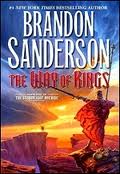Tall, Long, Deep, and Wide: Weighing Your Books

Barnes and Noble and I are old friends. We go way back, went on some double dates back in the day, you know? So I try to stop in pretty frequently to see how the old boy’s doing. He’s such a welcoming host I usually don’t leave without a new book or two in hand, even though my To-Be-Read pile is starting to resemble a fortress made of paper bricks and dusty mortar.
My confession is that, when I’m deciding exactly which books are going to accompany me home, I look at all the usual factors: Blurb, cover art, quality of the first page or two, and any positive or negative vibes about book or author I’ve absorbed from the aether. But I also weigh the book, and surreptitiously pull out a tape measure to check how many inches separate the covers.
In the past year or two, I’ve come to favor books that present a svelte profile over thousand page tomes. It’s not that I haven’t loved some chunky books in my time, but I’m increasingly confronted with an elemental and morbid truth: Time, and life, are limited. I work full time in the software field. If I can get an equal amount of joy and smiles from a five hundred page book as I would from a saga five times that length, the five hundred pager looks much more attractive.
My standards are higher the longer the book is. I’m much more inclined to be forgiving of a mystery or sword-and-sorcery novel that takes me an evening or two to enjoy than of a rambling epic that rivals the Encyclopedia Britannica for both number of volumes and number of characters.

This isn’t to say I haven’t enjoyed some hefty books in my time–some of my best friends weigh a pound or two. Brandon Sanderson’s The Way of Kings is one of the coolest books I’ve read in the last year, and another of my new favorite authors, Brent Weeks, writes cozy, 600 page adventures. At the same time, I lost interest in Rothfuss’ The Wise Man’s Fear after six hundred pages, quit after eight hundred pages, and currently feel a faint resentment towards it for eating up reading time that could have been spent reading two or three other novels, and maybe giving The Last Unicorn or A Wizard of Earthsea a long overdue re-read.
See what I did there? The Last Unicorn is less than 300 pages, and the A Wizard of Earthsea is barely over novella length, and yet both of them are fantastic books with beautiful and wonderful things on every page. I can’t see a way in which either book could be improved by adding four or five extra viewpoint characters, an intertextual monograph on the economics and marriage customs of Earthsea, and a few cliffhangers to make sure the reader snatches up Tehanathon: Son of Tehanu, Part 1 of the Tehanu Legacy Saga.
I also count Frank Herbert’s Dune and Richard Adams’ Watership Down among the greatest epics ever told. Each of them are good-sized books, telling stories that feel deep and expansive in a single volume. Yes, I know there are sequels to Dune, but I’ve never worked up the appetite for reading them. Dune feels complete to me. The same goes for Watership Down — there is a sequel, of sorts, in Tales of Watership Down , but it’s more like a collection of extras, or deleted scenes, than a necessary continuation of the story.

In my heart of hearts, I resent authors who expand a one-book story into three books, or a four-hundred page story into eight hundred pages. I always feel like they’re committing an act of unwarranted presumption upon my scarce leisure hours. Trust yourself, author: if I like one book from you, I will read others. But please don’t force me to read a million words before I can really say I’ve read one of your books. This is my advice to you, not as a colleague, but simply as a reader and consumer of fiction.
You want to write more about the same characters? I’ll devour it. Another novel in the same fascinating world? Preach it, brother! But don’t waste my time with needless diversions, bloated prose, and navel-gazing. Write novels, not mere installments.
Do that, and I’ll love you for it.
It’s as though you’ve read my mind. I also am tired of mammoth novels that have been stuffed to the point that I have thrown some across the room. I refuse to get involved in “First in a Trilogy” because of that. I love a well written novel no matter the length provided that it isn’t filled with plot distractions. I sometimes feel that these books are done this way so that the publisher can justify an increased price. It certainly doesn’t do anything to enhance the storyline.
[…] the Black Gate blog, Sean Stiennon has a few thoughts on book length: Long, Deep, and Wide: Weighing Your Books. “In the past year or two, I’ve come to favor books that present a svelte profile over thousand […]